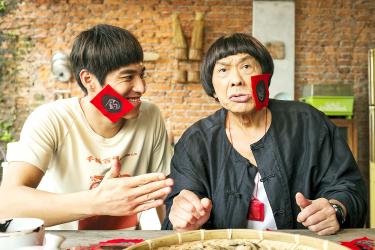Source: Taipei Times (12/28/17)
Year in Review: Taiwanese Cinema
By Han Cheung / Staff reporter

Blue Lan, left, and Chu Ko Liang play a father and son in Hanky Panky. Chu died in May at the age of 70. Photo courtesy of Hualien Media
Suffering through a number of terrible local movies throughout the year makes the good ones truly worth it. Three favorites in particular come to mind — but first, let’s pay tribute to Chu Ko Liang (豬哥亮), the legendary and often crass Taiwanese entertainer who died at 70 years old in May.
Liang’s sixth-straight and unfortunately his final Lunar New Year blockbuster Hanky Panky (大釣哥) continues his over-the-top act with plenty of melodrama and his trademark bathroom humor, although he does rein in the weirdness at times for some surprisngly emotional scenes. The resulting product is an unspectacular yet solid Liang-style comedy with a decent storyline and a surprising amount of chuckles, which was exactly what people are looking for in a holiday blockbuster. Liang should not be remembered as a fool just because of his bumbling on-screen persona. There’s a reason he was been able to stay relevant despite pulling the same old tricks decade after decade. He knew how to tell a story, and most importantly, he knew how to make fun of himself — which is where most other Taiwanese screwball comedies fall short.
My top film of the year is documentary The Silent Teacher (那個靜默的陽光午後), which managed to drive almost the entire theater to tears. Director Maso Chen (陳志漢) tackles a potentially morbid subject with sensitivity, crafting a tender and informative documentary on “silent teachers” (大體老師), or people who have donated their body to medical schools for dissection. The tale is told through the eyes of Lin Hui-tsung (林惠宗), whose wife’s body is being prepared for dissection in Taipei. Lin is an excellent central character, seemingly unaffected by his wife’s death but travels from Chiayi to Taipei every month to update her body on how the family is doing. Chen also gives ample screen time to the medical students, who have to interact with the cadaver’s family as the professors stress that the class teaches more than medical knowledge — it’s a lesson on respecting life. Like the class, the scope of the film reaches beyond the direct subject matter, exploring the deeper themes of life, death and what it means to be human.
The Bold, the Corrupt and the Beautiful (血觀音) is completely drenched in cold blood with lies upon lies, backstabbing and underhanded dealings. You might have to watch the movie twice if you can’t decode all the hidden meanings behind each sentence or make sense of the director’s of use of fabricated memories, subtle imagery, metaphors and implied events. Fourteen-year-old Vicky Chen (陳文淇) fully deserves her Golden Horse award for best supporting actress — but Patty Wu (吳可熙) feels just as legitimate for consideration. Kara Hui (惠英紅) rightfully won best actress, but if feels that the director went overboard with her lines as each one is as loaded with metaphors and hidden daggers. It’s still hard to pull off such a character, who maintains her grace and dignity despite oozing with vileness, and Hui’s performance is chilling and unsettling nevertheless.
Love Education (相愛相親) is a solid effort by actress-director Sylvia Chang (張艾嘉), who continues her exploration of family relationships, gender roles and, most importantly, facing and reconciling one’s feelings about the past. It’s the first Chang production filmed in China.
Chang plays Huiying, a headstrong, insensitive and controlling schoolteacher often alienates those around her, including her husband and daughter. This dislikable personality is what drives the film, which is a low-key, mature dose of reality featuring three generations of women, each about 30 years apart.
Finally, I would like to mention two films that I expected to be horrific but turned out okay: Mom Thinks I’m Crazy To Marry A Japanese Guy (雖然媽媽說我不可以嫁去日本) and Take me to the Moon (帶我去月球).